










































Samuel Lincoln Woodward faces life in prison with no parole
By TROY MASTERS
Samuel Lincoln Woodward, 26, of Newport Beach, was found guilty by an Orange County jury on Wednesday of first-degree murder with a hate crime enhancement in the killing of 19-year-old Blaze Bernstein. The verdict followed a three-week trial detailing Bernstein’s brutal stabbing death on Jan. 2, 2018. Bernstein, a University of Pennsylvania pre-med student, was home for the winter holidays when he went missing on Jan. 3, 2018. His parents reported him missing after he failed to attend a scheduled dentist appointment.

contrast, Woodward dropped out of college and traveled to Texas, where he affiliated himself with the Neo-Nazi extremist group Atomwaffen Division, before eventually returning to his parents’ home in California.
Woodward allegedly picked up Bernstein near his family’s Lake Forest home at 11 p.m. Hours later, Bernstein’s body was discovered buried in a shallow grave in a Lake Forest park, having suffered 28 stab wounds.
“Investigators also found a ‘hate diary’ detailing Woodward’s online efforts to deceive gay men into thinking he was ‘bi curious’ before cutting ties with them,” the Orange County District Attorney’s office reported.
District Attorney Todd Spitzer emphasized Woodward’s immersion in hateful ideology and his deliberate targeting of Bernstein because of his sexual orientation.
“Hate will never be tolerated here in Orange County,” Spitzer declared. “Instead of a figure to be admired by other haters, Woodward serves as a stark reminder of our commitment to protecting vulnerable members of society from violence fueled by hatred and fear.”
During the investigation, it was revealed that Bernstein’s last communication was with Woodward via a dating app. They had arranged to meet on the night of Jan. 2, according to prosecutors.
Both were students at the Orange County School of the Arts. Bernstein briefly attended the University of Pennsylvania to study pre-medical courses before returning to California. In
“After having killed Bernstein, buried his body and cleaned up, Woodward sent a text to a friend, ‘hey man, life is good,’” the Orange County District Attorney’s office stated.
Prosecutors argued that Woodward, associated with the neo-Nazi group Atomwaffen Division, had trained with the group in Texas and possessed items linking him to the crime, including a knife with Bernstein’s blood and a skull mask representing his allegiance to Atomwaffen.
Upon hearing the verdict, cheers erupted in the courtroom, according to NBC Los Angeles.
“We are relieved that justice has been served and that this individual, who committed such a heinous act against our son, will no longer pose a threat to society,” said Jeanne Pepper Bernstein, Blaze Bernstein’s mother, during a press conference following the trial.
Woodward faces a potential life sentence without parole when he is sentenced on Oct. 24.
Craig Berberian presented with Ed Levin Award for Design Excellence
By LA BLADE STAFF
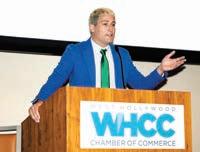
The City of West Hollywood and its chamber of commerce joined forces Tuesday to host the State of the City 2024 event, bringing together community leaders and experts to discuss “Progressive Economics: Putting Progress Back in Progressive.”
The annual gathering, held 1 Hotel West Hollywood, aimed to highlight the city’s achievements, outline future initiatives, and explore strategies for fostering inclusive and sustainable economic growth in the 1.9-square-mile city known for its vibrant culture and diverse community.
Mayor John M. Erickson delivered the keynote address, emphasizing West Hollywood’s commitment to innovation and sustainable development.
“Our city continues to be a beacon of progress, combining economic vitality with our core values of inclusivity and sustainability,” Erickson said.
City Manager David Wilson echoed this sentiment, stating, “We’re not just talking about progress; we’re actively implementing policies that make West Hollywood a model for progressive urban economics.”
The event featured a panel discussion on progressive economics, moderated by Jonathan K. Wilson, chair of the West Hollywood Social Justice Advisory Board. Panelists included California State Treasurer Fiona Ma, LAEDC President Stephen Cheung, UCLA Anderson School of Management Professor
Avanidhar Subrahmanyam, and local business owner Jacob Shaw.
Ma emphasized the state’s role in supporting local economic initiatives.
“West Hollywood’s approach aligns perfectly with our statewide efforts to create an economy that works for everyone,” she said.
Stephen Cheung highlighted the importance of balancing growth with community needs.
“Progressive economics isn’t just about numbers; it’s about creating opportunities that uplift all segments of society,” Cheung noted.
A highlight of the afternoon was the presentation of the Ed Levin Award for Design Excellence to Craig Berberian, founder and managing partner of Empire Property Group. The award, named after the late architect and civic leader Ed Levin, recognizes significant contributions to West Hollywood’s architectural landscape.
Upon receiving the award, Berberian expressed his gratitude and commitment to the city’s development.
“This prestigious recognition inspires me and Empire Property Group to continue pushing the boundaries of design, creativity, and innovation,” he said. “Adopting a resident-first approach coupled with a sustainable lens has the power to transform living spaces and enhance the lives of our residents.”
Berberian also praised the city’s leadership, adding, “Thanks to the strong leadership of our mayor, the City Council, and the city manager, the city continues to be a highly desirable place to live, work and play. In a mere 1.9 square miles, it encapsulates rich artistic culture, bustling entertainment, a vibrant restaurant and nightlife scene, and a tight-knit residential com-
munity.”
The event also served as a platform to bid farewell to Deborah Kallick, vice president of government and industry relations for Cedars Sinai Medical Center, who stepped down after 22 years as a chamber board member. Her tenure was marked by dedicated service and significant contributions to the community.
David Wood, chair of the West Hollywood Chamber of Commerce, underscored the importance of public-private partnerships in driving economic prosperity.
“Our collaboration with the city government has been instrumental in navigating challenges and seizing opportunities for growth,” Wood said.
Genevieve Morrill, president of the West Hollywood Chamber of Commerce, added, “Events like these are crucial for fostering dialogue and aligning our efforts towards a common goal of a thriving, inclusive West Hollywood.”
The State of the City event comes at a time when many urban centers are grappling with post-pandemic economic recovery and social equity issues. West Hollywood’s focus on progressive economics signals its intent to address these challenges head-on, balancing economic growth with social responsibility.
As the city looks to the future, the discussions and recognitions at this year’s State of the City event reflect a community committed to innovation, sustainability, and inclusive growth. With its unique blend of culture, commerce, and community, West Hollywood continues to position itself as a leader in urban development and progressive policies.
State of the City concluded with networking opportunities for attendees, connecting business leaders, city officials, and community members.


Noel Coward’s classic comedy searches for new ways of living
By ROB SALERNO
Nearly 100 years before Challengers lit up screens with its teasing story of a bisexual love triangle, Noel Coward scandalized Broadway and London stages with his daring play Design for Living, that challenged norms around monogamy and sexuality with its frank portrayal of a three-way relationship. And now, Odyssey Theatre is bringing the queer classic back to the stage for a summer run from July 6-Aug 25 at the West Los Angeles venue.
Design for Living follows a trio of artists –playwright Leo, painter Otto, and designer Gilda – as they navigate an ever-shifting triangular relationship in the 1930s. It’s full of the characteristic wit that’s made Noel Coward one of the twentieth century’s most-produced comedic playwrights, but the play was considered so scandalous at the time that it the official censor of London theatre banned productions of it for six years.
Coward was inspired to write it by the open and polyamorous relationship of his longtime friends, the Broadway stars Alfred Lunt and Lynne Fontane, with whom he starred in the
original Broadway production.
And while polyamory and bisexuality are hardly the taboo topics they were during the Great Depression, director Bart DeLorenzo says open and fluid relationships still challenge many people’s perceptions of propriety.
“I wouldn’t say that’s the last taboo, but it’s unusual. You see people struggling with their families and there are all sorts of heteronormative pressures,” DeLorenzo says. “I do think there are people in the world who aren’t happy themselves and don’t want other people to be happy.
“I don’t know why people want to regulate the intimate details of other people’s lives, but for some reason there’s a desire to do that. And so, I don’t think the issues of this play have really gone away.”
DeLorenzo says the play documents an important point in Coward’s life, shortly after his rise to fame, as he tries to navigate the limited opportunities he had to pursue romance and happiness as a gay man.
“He’s writing it in the 1930s, and he’s had his
Attorney General Rob Bonta released report this week
By TROY MASTERS
California Attorney General Rob Bonta released the state’s annual hate crime report this week, unveiling a disturbing landscape of persistent challenges. While overall hate crimes in California decreased by 7.1 percent from 2022 to 2023, certain communities face escalating threats, particularly the LGBTQ, Jewish, and Muslim populations.
The report comes as several states have passed harmful legislation targeting LGBTQ individuals, especially transgender people. These discriminatory laws range from bans on gender-affirming care to restrictions on LGBTQ content in schools, transgender children to drag performances, sparking outrage and protests nationwide.
The 2023 Hate Crime in California Report, released by Bonta, provides a detailed breakdown of hate crime statistics across the state. While the overall number of reported hate crime events decreased by 7.1 percent from 2,120 in 2022 to 1,970 in 2023, the report reveals concerning trends for specific communities.
Notably, hate crimes motivated by religious bias saw a significant increase of 30 percent, with anti-Jewish bias events rising by an alarming 52.9 percent and anti-Islamic (Muslim) bias events also showing a substantial increase.

first bath of success, and I think he’s looking around at the world and trying to figure out what kind of life he wants to live,” De Lorenzo says. “What’s funny about the play is that he will go on to invent a kind of a new family and a new way to live, not exactly like the play but similar. But he had no idea that that’s where he was headed.”
So even though the play is a hilarious comedy, DeLorenzo says it’s still one of the most serious dramatic works Coward wrote.
“I think it’s a look for new models because there should be more choices. There should
at large nearly doubled, showing an 86 percent increase from 2022.
be more possibilities. And I think it really helps to have models of people who have found other ways to be happy,” he says. “It’s about trying to find a way to live the life that you want to live, even when Society doesn’t appreciate it.”
One luxury this production has over the original Broadway production – and perhaps even over modern Hollywood fare exploring polyamory – is its freedom to bring the homoerotic sides of the polyamory polygon.
“There’s a very sexy and romantic scene between the two men. It’s a very funny scene. But I think it’s a very sexy scene but between them,” DeLorenzo notes of his production.
“That’s what’s interesting about the play too. Is that Coward gives the biggest scene in the play to the two men. There’s a very nice seduction of a hetero couple in the piece but in a way, I think the gay couple gets the best romantic scene.”
Design for Living plays at the Odyssey Theatre July 6-Aug 25. 2055 S. Sepulveda Blvd. Los Angeles CA 90025. Tickets $20–$37, Fridays Pay-WhatYou-Can. OdysseyTheatre.com
The LGBTQ community faced heightened targeting, with anti-trans bias events increasing by 10.2 percent and overall anti-LGBTQ bias events surging by 86.4 percent from the previous year. Despite remaining the most prevalent category, anti-Black bias events decreased by 20.6 percent, reflecting a broader 21.6 percent decrease in hate crimes involving racial bias. The report also indicates a slight increase in hate crimes referred for prosecution, rising from 647 in 2022 to 679 in 2023, with 463 cases filed for prosecution, of which 322 were specifically filed as hate crimes.
These statistics paint a complex picture of hate crime trends in California, highlighting the need for continued vigilance and targeted efforts to protect vulnerable communities, particularly religious minorities and LGBTQ individuals, while maintaining momentum in reducing racial bias incidents.
Against this backdrop of increasing hostility, California’s data presents a troubling picture. While the overall number of reported hate crime events in the state decreased, the LGBTQ community saw alarming increases. Sexual-orientation-based hate crime events rose by 4.1 percent, and anti-trans bias events surged by 10.2 percent. Most disturbingly, hate crimes targeting the LGBTQ+ community
Equality California, a statewide LGBTQ civil rights organization, directly linked this spike to anti-LGBTQ legislation and rhetoric both within California and across the country. Executive Director Tony Hoang emphasized, “These statistics aren’t a surprise. Hate does not happen in a vacuum."
Anti-Black crimes remained the most prevalent, despite a 20.6 percent decrease from 652 in 2022 to 518 in 2023. The Jewish and Muslim communities also faced significant increases in hate crimes. Anti-Jewish bias crimes rose by 52.9 percent, while anti-Islamic hate crimes jumped by 60 percent.
Bonta stressed the urgency of the situation: “Some of our communities, including our LGBTQ+, Jewish and Muslim communities, continue to be targeted and endangered by hate at alarming rates. I urge everyone to review the data and resources available and recommit to standing united against hate.”
The report also revealed that the number of hate crimes referred for prosecution increased slightly from 2022 to 2023, representing about a third of total reported hate crimes. This suggests a more aggressive approach to addressing hate crimes in the state’s legal system, but also indicates that many perpetrators still escape justice.
LGBTQ advocates are mobilizing to combat these challenges. Community leaders are urging people to vote in November when en-
shrining marriage equality in the state’s constitution will be on the ballot. This move is crucial as LGBTQ rights face attacks and potential rollbacks in other parts of the country.
Calif. issues alert to law enforcement
Bonta reaffirmed California’s commitment to fighting hate crimes, announcing an updated bulletin to law enforcement agencies with revised guidelines on addressing hate-motivated acts.
“The California Department of Justice has a zero-tolerance policy when it comes to hate and will continue working with law enforcement, elected leaders and community organizations across the state to keep our communities safe through education, prevention, and enforcement,” he stated.
As California confronts these challenges, the state’s response stands in direct opposition to the discriminatory actions of some other states. While some regions are enacting laws that strip away LGBTQ rights, California is strengthening its commitment to protecting civil rights and fostering an inclusive society.
The release of this report serves as an urgent call to action for Californians and Americans at large. It underscores the critical need for continued vigilance, community engagement, and legislative action to protect the rights and safety of all residents, particularly those from marginalized communities.
As Bonta declared, “An attack against one of us is an attack against all of us — there is no place for hate in California.”


By TROY MASTERS

In response to mounting pressures on LGBTQ rights across the nation, California lawmakers have introduced Assembly Bill 3031 that would create a statewide LGBTQ commission.
This initiative comes at a critical juncture, as the LGBTQ community faces intensifying challenges even within the traditionally progressive Golden State.
Recent years have seen a troubling trend in smaller California cities, where school boards face pressure from anti-LGBTQ groups to withdraw supportive curriculum and disband LGBTQ student organizations.
In communities like Chino Hills, for instance, school boards have passed policies requiring schools to forcibly out transgender students to their parents, a move that has sparked intense debate and concern among LGBTQ advocates. These local battles mirror a larger national movement seeking to limit LGBTQ visibility and support in educational settings.
Simultaneously, some city councils, most recently in Downey, have moved to ban the Pride flag from flying on public property, a symbolic gesture with far-reaching implications for LGBTQ acceptance and representation.
At least one leader of these efforts, Claudia Frometta, a Downey, California councilmember who unsuccessfully voted against funding of LGBTQ Pride events in that city and one year later lead a successful effort to ban the flying of the Rainbow Flag on city property, has risen to national prominence. Frometta was recently elected President of the highly influential National Association of Elected Officials (NALEO)
Such developments contribute to a climate of exclusion and send a powerful message about the value placed on LGBTQ lives and experiences in these communities and organizations.
These local actions unfold against a backdrop of rising hate crimes targeting LGBTQ individuals.
Between 2021 and 2022, California witnessed a 29 percent increase in reported hate crimes motivated by sexual orientation bias, totaling over 391 incidents. This surge in violence has sparked alarm among LGBTQ advocates and underscores the urgent need for comprehensive state-level action to protect and support the LGBTQ community.
The proposed commission aims to address these multifaceted challenges.
Assemblymember Alex Lee, who serves California’s 24th Assembly District (Alameda County and Santa Clara Coun-
ty), the bill’s author, emphasized its importance:
“It’s critical that the lived experiences of LGBTQ+ community members are recognized by our government,” he said. “The commission will play an important role in informing policy and programs for the LGBTQ+ community.”
LGBTQ advocates have expressed particular concern over the wave of anti-LGBTQ+ legislation sweeping across the country.
In 2023 alone, 520 anti-LGBTQ bills were introduced in more than 40 states, with 84 signed into law. The pace has not slowed in 2024, with 490 such bills proposed by June. This legislative onslaught has targeted various aspects of LGBTQ life, from restricting access to gender-affirming care for transyouth to limiting discussions of LGBTQ topics in schools.
Adding to these concerns is the Republican Party’s Project 2025 blueprint — a comprehensive plan that outlines potential rollbacks of LGBTQ rights should the party regain control of the White House. This document suggests threats to marriage equality and protections in employment and housing and other hard-won victories. The combination of ongoing legislative attacks and the potential for sweeping federal changes has created a climate of uncertainty and fear within the LGBTQ community, even in progressive states like California.
Equality California Executive Director Tony Hwang highlighted the urgency of the situation.
“California has come a long way in the fight for full, lived equality for LGBTQ+ people, but our state is not immune to the wave of anti-LGBTQ+ hate, violence and right-wing extremism sweeping the country,” he said. “California’s commitment to the health, safety and dignity of LGBTQ+ people is needed now more than ever.”
The proposed commission would consist of nine members representing California’s diverse LGBTQ community. The governor would appoint five members, while the Assembly speaker and the Senate Rules Committee would each appoint two members. This structure aims to ensure a broad representation of perspectives and experiences within the LGBTQ+ community.
The commission’s responsibilities would be wide-ranging and impactful. It would act in an advisory capacity to the state legislature and governor on policy matters affecting the LGBTQ community. This would involve monitoring proposed legislation and regulations, coordinating with other relevant commissions on issues of mutual concern, and working with state agencies to assess the impact of their programs and policies on LGBTQ individuals.
The commission would also engage in fact-finding and data collection to gain a comprehensive understanding of the experiences and needs of LGBTQ Californians. This would involve holding public hearings to gather input directly from community members, as well as conducting research on various issues affecting the LGBTQ population.
The commission would be required to submit annual reports to the legislature and governor, summarizing its findings and offering policy recommendations to address the needs of the LGBTQ community.
The bill has garnered support from various quarters, including local government bodies.
The Los Angeles County Board of Supervisors on June 25 officially threw its support behind AB 3031.
Supervisors Lindsey Horvath and Hilda Solis in a motion they put forth said the bill would create a commission “that represents California’s diverse LGBTQ+ community and shines a light on the unique challenges that LGBTQ+ people face.”
The Bay Area Municipal Elections Committee President Drew Lloyd told the Bay Area Reporter that having “a commission that addresses disparities facing California’s queer community and works to elevate our community’s unique experiences, voices, and concerns, is invaluable. BAYMEC enthusiastically endorses the creation of this commission and looks forward to working with all stakeholders and our community to create a safe and unique space that leads to a better California for all.”
“I thank my colleague Assemblymember Alex Lee for introducing this important legislation to establish the California LGBTQ+ Commission, which will empower our LGBTQ+ community with independent representation to advise the Legislature and governor on policy matters and provide recommendations for future actions we can take to identify and reduce systemic inequalities and barriers,” Assemblymember Evan Low, co-sponsor of AB 3031 and a member of the Legislative LGBTQ Caucus, stated,
As AB 3031 progresses through the legislative process, it represents California’s proactive stance in safeguarding LGBTQ rights amidst a challenging national landscape. The commission’s establishment would signal the state’s commitment to not only maintaining existing protections but also actively addressing the evolving needs of its LGBTQ residents in the face of unprecedented threats to their rights and well-being.
The creation of this commission comes at a time when LGBTQ Californians, estimated at 2.7 million or roughly 9 percent of the state’s adult population, face both longstanding and emerging challenges. From workplace discrimination and healthcare disparities to the recent surge in anti-LGBTQ rhetoric and policy proposals, the need for a dedicated body to address these issues has never been more apparent.
As the bill moves forward, many in California’s LGBTQ community and their allies are hopeful that this commission will provide a powerful voice for their concerns at the highest levels of state government. In doing so, it may serve as a model for other states seeking to protect and empower their LGBTQ residents in an increasingly challenging political climate.


Garcia
also reiterates support for president after debate debacle
By CHRISTOPHER KANE | ckane@washblade.com
After congressional Democrats emerged from closed-door meetings on Tuesday, House and Senate leaders reassured the media of their continued support for President Joe Biden in his bid for reelection.
As lawmakers returned from the July 4 break this week, a handful of Democrats publicly urged the president to step aside, following a debate performance last month that worsened concerns regarding the candidate’s age, signs of a potential decline in his mental acuity, and questions over his ability to bring the vigor necessary to lead the ticket.
However, speaking with the Washington Blade on Tuesday, U.S. Rep. Robert Garcia (D-Calif.) shared his thoughts on why “it is time to move forward” from Biden’s debate performance and “focus on attacking Donald Trump and the dangers that he poses.”
The congressman was clear that colleagues who have a different opinion should feel free to express their concerns — and, to that end, he said leadership has “been incredible in hearing members who have sought out input” from them.
“The president had a rough debate, and I think he recognizes that, and I think we all recognize that it was not a great moment,” he said. “I respect the people that have had those concerns and the conversation that’s happened since, so, I get that.”
“Personally, I’ve known from day one that Joe Biden is going to be our nominee,” Garcia said. “He reinforced that with everyone, and it is time to move forward. I’ve been behind the president and the vice president. I continue to be.”
Every day the Democratic Party continues having these conversations internally, “we’re not out there defeating Donald Trump,” the congressman added. “I think for some folks it’s going to take some time for them to feel comfortable, and that’s OK [but] I’m ready to go. I’m fired up and ready to go.”
Garcia, who’s gay, serves as a vice-chair of the Congressional Equality Caucus, alongside some LGBTQ Democratic members who agree with his position, like Ritchie Torres (N.Y.), and
others who do not, like Mark Takano (Calif.) and Angie Craig (Minn.), who have called for Biden to step aside.
When it comes to LGBTQ voters, “from our perspective, I think we’ve just got to understand that we have the most proLGBTQ+ administration in the history of politics in front of us, and we have Donald Trump on the other side,” Garcia said. “Those are our choices.”
“You don’t have to love every choice you make, but we have to understand the stakes, and we have to understand that there is a binary choice,” he said. “Every person that’s not voting, or not voting for Joe Biden, is certainly empowering Donald Trump. That’s the reality of the moment we’re in.”
Asked how the Biden-Harris campaign can outrun the speculation about the president’s age and the calls from some Democrats for him to step aside, Garcia said “the president has to continue what he’s been doing for the last couple of days. And I think what you’ve seen in the last few days is a fighting Joe Biden.”
“Joe Biden is proving that if he’s going to get punched in the nose, he’s going to punch back twice as hard,” the congressman said. “And I think that is where the campaign is headed, and what needs to continue to happen.”
Weathering the moment in which “the president did have this really bad debate night,” Garcia said, has “also invigorated the campaign and him” with Biden and his team realizing “this is serious, we have a real challenge, here. And let’s get this done.”
Kelley Robinson, president of the Human Rights Campaign, America’s largest LGBTQ rights organization and a group that has made major investments in Biden’s reelection effort, also reaffirmed her support for the president in a statement to the Blade on Tuesday.
“Donald Trump and his Project 2025 agenda pose an existential threat to our rights, freedom, and democracy itself,” she said. “Our job remains the same: defeat him. Biden-Harris is the ticket to do it and we are proud to stand by our endorse-
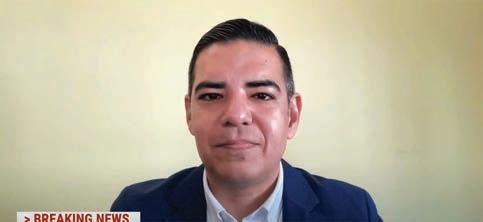
ment.”
Asked for comment, a GLAAD spokesperson said “as a [501] C3 nonprofit org, we focus on voter and reporter info and resources, to inform about elevate facts on the candidates’ records and statements about LGBTQ people.”
The spokesperson referred the Blade to a statement by the group’s president, Sarah Kate Ellis, which was issued shortly after Biden’s televised debate against Trump.
“Media must do their job to ask questions of candidates about their records and plans for and against LGBTQ people. Our community is enduring an onslaught of attacks on our lives and fundamental freedoms. Everything from our marriages to our ability to have children to keeping schools safe for LGBTQ youth is on the ballot.
“The candidates’ records are very clear, and voters need to be informed about this history to make the best decisions. Reporters and moderators must challenge candidate rhetoric for facts about abortion, immigration, inflation, and the security of each person’s vote.
“CNN failed to find time in 90 minutes to ask about Project 2025, the fascist fever dream that is laying a path for anti-LGBTQ zealots to weaponize the government to fully eliminate abortion access and LGBTQ people from equal access in American life.
“Accurate information is essential for voters to choose a leader who values the truth, decency, and who will work to ensure freedom and equality for all Americans.”
The GLAAD accountability project includes detailed entries for Trump and Biden, detailing the candidates’ records on and rhetoric concerning LGBTQ matters.
HRC slams White House for opposing gender-affirming surgeries for minors
Human Rights Campaign President Kelley Robinson issued a strong rebuke last week of the Biden-Harris administration’s position opposing gender affirming surgeries for minors.
The New York Times reported on June 28 that the White House, which broadly supports making medical interventions available for transgender youth, had expressed opposition to surgeries for patients under 18, having previously declined to take a specific position on the question.
“Health care decisions for young people belong between a patient, their family, and their health care provider. Trans youth are no exception,” Robinson responded.
“The Biden administration is flat wrong on this. It’s wrong on the science and wrong on the substance. It’s also inconsistent with other steps the administration has taken to support transgender youth. The Biden administration, and every elected official, need to leave these decisions to families, doctors and
patients—where they belong,” she added. “Although transgender young people make up an extremely small percentage of youth in this country, the care they receive is based on decades of clinical research and is backed by every major medical association in the U.S. representing over 1.3 million doctors.”
Robinson said the “administration has committed to fight any ban on healthcare for transgender youth and must continue this without hesitation—the entire community is watching.”
“No parent should ever be put in the position where they and their doctor agree on one course of action, supported by the overwhelming majority of medical experts, but the government forbids it,” she added.
HRC is a prominent backer of Biden’s 2024 reelection campaign, having pledged $15 million to support efforts in six battleground states. The organization has a strong relationship with the White House, with the president and first lady headlin-
ing last year’s National Dinner.
A White House spokesperson declined to respond to Robinson’s statement.
Campaign for Southern Equality President Allison Scott also issued a statement.
“This is a cowardly statement from an administration that promised to support transgender people. It is a troubling concession to the right-wing assault on transgender Americans, falling for their false narratives about surgical care and betraying a commitment to equality and trust in the medical community,” said Scott.
“Let’s be very, very clear: Government has no business inserting itself into private medical decisions that should be exclusively between patients, their providers, and the patients’ parent or guardian,” Scott added.
CHRISTOPHER KANE
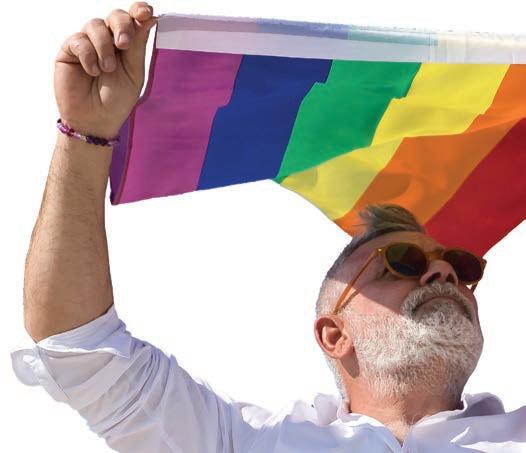



‘Technology was the key to my freedom’
By HENRY CARNELL
It is common knowledge that women earn 84% of the average worker. Less common knowledge? Trans women earn 60% of the average worker. Trans men and non-binary people come in at around 70%, while 16% of all trans people make less than $10,000 annually.
E.C. Pizarro was lucky, and he knew it. He had a BFA in graphic design and had taught himself how to code. As a stealth trans man in a corporate job, he had access to a stable wage and good benefi ts. “People that do not have experiences in corporate America or with equitable employment don’t realize [these things] are privileges that a lot of people don’t have access to.”
He wanted to give back and was gearing up to bring more volunteer work into his life by participating in a fraternity for trans men. When he went to a TransTech event and learned about the educational and career resources for trans people who face barriers to entering the workforce, he knew he had found his place.
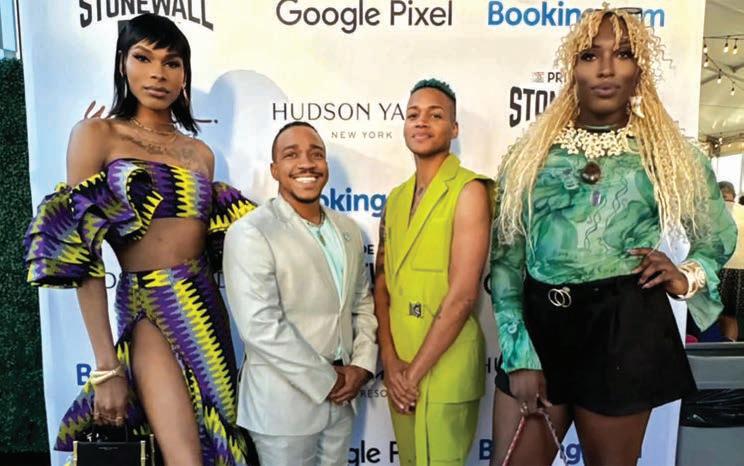
At the event he met, Angelica Ross. Yes, that Angelica Ross, of “Pose” and “American Horror Story.”
Before she was Candy, Ross was a self-taught coder. She went from posing for an adult website to doing its back-end coding to teaching her trans siblings how to succeed in tech.
“Technology was the key to my freedom,” Ross said in an interview with The Plug “Technology took me from being exploited on someone’s website to building my own websites and to building websites for other people and getting paid to do so.”
Pizarro was impressed and wanted to help. “I went up to Angelica and I was like ‘Hey, I’m a trans man. These are my skills. I’m down to volunteer and do any type of work— the one caveat is that I’m stealth. You can’t tell anybody that I’m trans.’”
For four years, Pizarro helped from mostly behind the scenes, sometimes getting side-eyed since people thought he was a cis man in trans spaces. “I was still stealth as the Director of Social Media and Communications for the National Trans Visibility March in 2019,” Pizarro says, chuckling a little.
But by that point, Ross — who headlined the 2019 march — was overextended trying to balance being a world-famous actress, advocate, and businesswoman.
She needed someone to step in as executive director of TransTech and looked to the group of dedicated volunteers. Pizarro was elected by his peers to take the reins of the
organization.
This was a turning point for Pizarro. “I’m very passionate about tech and for me a small sacrifi ce of being open with my trans experience to liberate other trans people,” he said. “I felt like if that’s something I got to do, then I’m gonna do it.”
And he did it. The infrastructure Ross put together worked: with mentorship, education, community, and networking with trans-accepting employers, trans people were gaining fi nancial security and independence.
So, Pizarro focused on expanding TransTech as widely as possible. “We have grown exponentially over the last three years,” he says. “When I took over in 2021, we had about 800 members based in the United States. Now we support over 6,700 members across 50 countries.”
TransTech is fi lling a demonstrated need within specifi cally the trans community. New research from LGBT Tech found that 68% of transgender adults use the internet to fi nd LGBTQ-friendly employment (compared to 38% of cisgender LGBTQ+ adults). More than 70% of all LGBTQ adults use the Internet to access educational content.
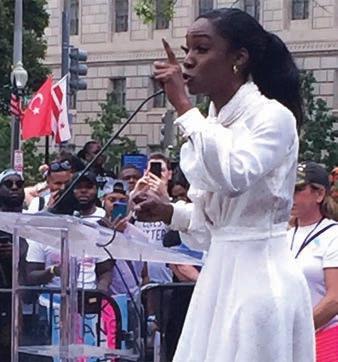
Accessibility is central to the TransTech programming. Despite the growth, everything remains free. “There’s no membership fee. All of our programming is free. All of the certifi cations and educational resources are free,” Pizarro says.
They know the fi nancial burden the trans community faces — 29% of trans adults live in poverty. “If we’re asking anyone to up-skill [for a cost] and these are the things they are going through, we are asking them to invest in their future versus their meal today.” Pizarro believes that accessibility is more than just making the training free. He wants the community to understand that tech work is something they are innately capable of doing.
“TransTech was built on the foundation of nontraditional tech. It’s not always coding. It’s graphic design. It’s social media. It’s video editing. It’s anything that uses a piece of technology and nowadays almost everything uses a piece of technology,” says Pizarro.
He emphasizes to participants: “You’re in tech and you don’t even know it,” pointing out how many already utilize tech skills like marketing and monetization with their social media accounts.
Some people involved in the programming are nervous about entering the “tech world” because of headlines about tech layoff s. He makes sure to emphasize that unlike in some other jobs, tech companies often pay generous severance packages, which gives employees “breathing room.” Pizzaro explains that “once you have experience with one tech company, you can go someplace else and make a substantial amount of money as well.”
While TransTech is designed for the gender-diverse community, the programming is open to everyone Pizarro explains. “We just ask that you don’t be transphobic.” (Or any of the other -phobics too, he says, listing them off .) He also emphasizes that this allows trans members who are not out to comfortably participate.
Pizarro wants everyone to understand that they don’t just belong in tech, but they make tech better. “Tech is most profi table when you have diverse people building the tech and using the tech,” Pizarro says. “There is an intentional funding as well as support to diversity tech because they understand how that impacts the product.”
He also reminds participants that they have developed transferrable skills in every part of their lives. “I like to tell people if you can manage your life as a trans person in the United States or anywhere you can manage a project.”

is editor of the Washington Blade. Reach him at knaff@washblade.com
The debate was terrible but it doesn’t mean Trump is inevitable
President Biden’s disastrous debate performance last week predictably brought the usual bed-wetting and panicking among Beltway Democrats.
Yes, the debate was bad and only reinforced many Americans’ concerns about Biden’s mental fi tness and ability to do the rigorous job of president into his mid-80s. It’s clear that Biden’s supporters and staff were keeping him away from press conferences and interviews due to their private concerns about his ability to perform. That was a grave mistake. The American public deserves regular access to their president. More press conferences, interviews, and even, perhaps, a competitive primary would have given voters more chances to see Biden up close without the aid of edits or Teleprompters. As the New York Times noted, by this point in his presidency, Barack Obama had given 570 news conferences, Donald Trump had given 468, while Biden gave just 164.
But let’s take a beat and remember a few key factors.
Donald Trump delivered a disastrous debate performance, too, and is nearly as old as Biden. Trump has off ered up a bewildering fl urry of mental slips, verbal gaff es, and outright nonsense that should alarm everyone.
When CNN’s Dana Bash asked Trump during the debate if he would do anything to address the climate crisis, his reply included this gem: “We had H2O” during his presidency. Huh? If Biden had said that, Fox News would run it on the hour for a week.
Frankly, I don’t care if Biden made a poo-poo in his pants during the debate. The alternative is a twice-impeached wannabe autocrat who is awaiting sentencing on 34 felony counts. Trump’s Project 2025, which he predictably and falsely denies knowing anything about, would be a war on women, the LGBTQ community, immigrants, and pretty much anyone who isn’t a white, cis, heterosexual, Christian male. His election would spell the end of our democracy as we know it with Trump and his allies vowing to expel career civil servants by the tens of thousands and replacing them with MAGA loyalists. Trump would round up, imprison, and deport hundreds of thousands of immigrants. Yes, the return of kids in cages. How quickly we forget. He would likely get two more Supreme Court picks following the expected retirements of Samuel Alito and Clarence Thomas, giving Trump a 5-4 MAGA majority, a truly terrifying prospect.
You can just imagine the Trump toadies who would be mem-
bers of his Cabinet; think Stephen Miller and Steve Bannon, who just reported to prison for contempt of Congress. Before you count Biden out, remember that he has surprised us before. His campaign was all but dead until Rep. Jim Clyburn endorsed him in the 2020 race, propelling him to the Democratic nomination over two-dozen opponents. He went on to defeat an incumbent president, never an easy feat, and send Trump packing.
He skillfully navigated the Jan. 6 crisis. He has since delivered stellar off -the-cuff performances during State of the Union addresses. He expanded NATO and has led the fi ght against Putin, something that Trump would surely abandon. Biden spearheaded, passed, and signed landmark legislation on infrastructure, marriage equality, and gun reform. He championed the American Rescue Plan to fi nally end the pandemic after more than 1.1 million American deaths under Trump. He signed the CHIPS Act, which has triggered nearly $300 billion in manufacturing investments by American companies. He promised to sign the bipartisan immigration bill authored by right-wing Republican Sen. James Lankford that was derailed only because Trump instructed the sycophantic Mike Johnson to kill it. Biden rejoined the Paris Climate Accords, issued executive orders on abortion, and pardoned all federal off enses for simple marijuana possession. The list goes on. These are not minor achievements, especially given our divided government and divided electorate. Many of these accomplishments came despite predictions that Biden would be a weak president incapable of overcoming division to get anything substantive done. By any measure he has been a great president who inherited a disastrous economy, record defi cits, and COVID.
Given this outstanding record, it’s disappointing that gay Rep. Mark Takano (D-Calif.) joined a handful of House Democrats in calling on Biden to withdraw. That was premature. Biden deserves a chance to reset and address the questions about his mental acuity. And if polls are to be believed, all of the battleground states remain within the margin of error so it doesn’t appear the debate proved as disastrous as many fi rst assumed. If Biden decides to drop out, it should be his decision and it’s unlikely that those few House Democrats will have any infl uence over it. If he doesn’t drop out, we must all double down to ensure he wins and that the Democrats hold the Senate and retake the House. The country, and our LGBTQ community, can’t aff ord another Trump term.
ADDRESS
8237 Blackburn Avenue Ste. 201, Los Angeles, CA 90048
PHONE 310-230-5266
E-MAIL tmasters@losangelesblade.com
INTERNET losangelesblade.com
PUBLISHED BY Los Angeles Blade, LLC
PUBLISHER
TROY MASTERS tmasters@losangelesblade.com, 310-230-5266 x8080
SALES & ADMINISTRATION
SALES EXECUTIVE
SHANA WONG SOLARES swong@losangelesblade.com, 808-386-0872
NATIONAL ADVERTISING
RIVENDELL MEDIA sales@rivendellmedia.com, 212-242-6863
MARKETING DIRECTOR
STEPHEN RUTGERS srutgers@washblade.com, 202-747-2077 x8077
EDITORIAL CONTRIBUTING WRITER
KAREN OCAMB karenocamb@losangelesblade.com
NATIONAL EDITOR
KEVIN NAFF
kna @washblade.com, 202-747-2077 x8088 EDITOR
KEVIN NAFF
Washington, D.C. CONTRIBUTORS
MICHAEL K. LAVERS, TINASHE CHINGARANDE, ERNESTO VALLE, YARIEL VALDÉS GONZALEZ, PARKER PURIFOY, CHRISTOPHER KANE, AUSTIN MENDOZA, JOHN PAUL KING, JOEY DIGUGLIELMO, CHRIS JOHNSON, LOU CHIBBARO JR., REBEKAH SAGER, JON DAVIDSON, SUSAN HORNIK, CHANNING SARGENT, SAMSON AMORE, CHRISTOPHER CAPPIELLO, MICHAEL JORTNER, DAN ALLEN, SEAN SHEALY, SCOTT STIFFLER, RHEA LITRÉ ADMINISTRATION
PHILLIP G. ROCKSTROH prockstroh@washblade.com, 202-747-2077 x8092
CREATIVE DESIGN/PRODUCTION
AZERCREATIVE.COM
DISTRIBUTION
CHRISTOPHER JACKSON, 562-826-6602 All material in the Los Angeles Blade is protected by federal copyright law and may not be reproduced without the written consent of the Los Angeles Blade. e sexual orientation of advertisers, photographers, writers and cartoonists published herein is neither inferred nor implied. e appearance of names or pictorial representation does not necessarily indicate the sexual orientation of that person or persons. Although the Los Angeles Blade is supported by many ne advertisers, we cannot accept responsibility for claims made by advertisers. Unsolicited editorial material is accepted by the Los Angeles Blade, but the paper cannot take responsibility for its return. e editors reserve the right to accept, reject or edit any submission. A single copy of the Los Angeles Blade is available from authorized distribution points, to any individual within a 50-mile radius of Los Angeles, CA. Multiple copies are available from the Los Angeles Blade o ce only. Call for






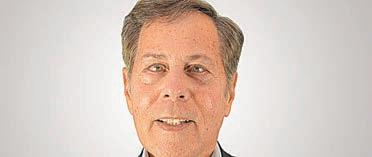
is a longtime LGBTQ rights and Democratic Party activist. He writes regularly for the Blade.
Younger generations deserve a say in their future
I will surely be challenged for these views, not the least being called ageist. But as someone older myself, I am comfortable with that. It is not that I think older people are not fully capable of functioning at a very high level; they are. I just believe we must let the next generations, who will be living much longer with the results of what government does, have more of a role in determining what that is.
Based on what we have seen of this Supreme Court, its willingness to overturn decades of precedent, the time has come to expand the court for a rational balance. In addition, we should set 24-year term limits for justices, or retirement at 80, whichever comes first. Changing the number of people on the court is not a new idea. The number of persons on the Supreme Court has been changed six times since our country was founded. The U.S. Constitution is silent about how many justices should sit on the Supreme Court.
“After the Civil War and Lincoln’s assassination, Congress clashed with Lincoln’s successor, Andrew Johnson, who was rapidly undoing the “Radical Republicans” plan for Reconstruction. To limit Johnson’s power, Congress passed legislation in 1866 that cut the number of Supreme Court justices back to seven, all but assuring that Johnson wouldn’t have the opportunity to fill a vacant seat. The last time Congress changed the number of Su-
preme Court justices was in 1869, again to meet a political end. Ulysses S. Grant was elected president in 1868 with the backing of congressional Republicans who hated Johnson. As a gift to Grant, Congress increased the number of justices from seven back to nine, and Grant gamely used those picks.” On today’s Supreme Court Clarence Thomas has now served 32 years, and Roberts and Alito, 19 years each. Then there was Ruth Bader Ginsburg. She was 87, and had served 27 years, when she died, clinging to her seat when it was known how ill she was. It is only recently I have come to this conclusion regarding the Supreme Court, and on term and age limits for the Congress. We are seeing too many older men, and women, cling to power. They may still have the mental acuity to perform their jobs, but entire generations aren’t serving because they refuse to leave. There is incredible power in incumbency, and we are seeing it abused. We are asking young people to vote for candidates old enough to be their grandparents, or great-grandparents. Some say they should revolt and change that. But the fact is, so much money is now in the game, the unlimited amount people can spend on their own campaigns, and collect from others, makes that nearly impossible. It’s rare to be able to fight incumbency and wealth. Yes, it can happen, as in the case of Maryland Congressman David Trone (D-Md.), who is 68, and tried to buy a United States Senate seat in

Maryland with $60 million of his own money. He lost his primary to Angela Alsobrooks, who is 53, whose campaign had less than a tenth of that. But she was a known entity, and elected official, in her own right.
Today, in the 100-member United States Senate, there is one senator over 90, four over 80, and another 10 over 70. I propose we set a limit of four terms, or 24 years, and mandatory retirement at 80. In the House of Representatives, which now has 11 members over 80, and 62 over 70, I would recommend a 12-term limit, or 24 years, and mandatory retirement at 80.
I have had conversations with many young people, and listened to their frustrations with their ability to move forward in politics. Many see the world differently than I do, and my belief is they are entitled to be making the decisions that will impact their lives, and not have the older generations continue to do so. I think being in office for 24 years is enough time to make a difference, and to accomplish what you wanted to do when you ran for office. And if you couldn’t do it, it is time to allow the next generations to try.
The desire to cling to power is natural. For many, the fear of retirement, and not knowing what they will do with their lives, is scary. I think one must plan for that, even politicians. They need to accept they can make a difference, even if not in office, if they really want to.

‘The most pro-LGBTQ+ thing you can do this election is to vote Democrat’
We often hear the term lobbyist associated with negative connotations. Think oil and gas initiatives that often seek to curtail environmental protections to further their industries. Consider “big pharma,” which is often vilified for keeping healthcare costs high. However, there are lobbyists fighting for our rights – not just LGBTQ rights, but human rights as well. Brad Howard, founder and president of the Corcoran Street Group (CSG) is one such out, gay lobbyist advocating for equality and equity.
To start, Howard shares his definition of a lobbyist, which transcends the stereotype that the term originates with politicos literally waiting in D.C. hotel lobbies hoping to hobnob with politicians to foster their interests, often with cash in hand.
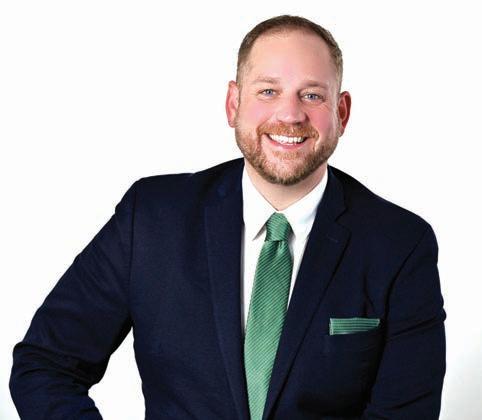
“Understanding how government works can be incredibly difficult, even to those on the inside,” he shared. “Lobbying is a constitutionally protected right explicitly guaranteed in the First Amendment – the right to petition our government. At its most basic level, lobbying is essentially contacting a public official to express your opinion or ask them to take a certain action. So, if you have ever emailed or called your city council rep or Member of Congress – or even tagged them on social media – you lobbied.”
Howard, who came to Washington from a conservative background in Arkansas, had a journey from working with Republican leaders and causes to being more libertarian before eventually joining with the Blue Dog Democrats. This is quite a change for a young man who founded a teenage GOP group in high school, chaired the college Republicans group at Hendrix University, and became vice chair of Arkansas College Republicans.
So, how did a nice conservative Christian Republican whose parents voted for Ross Perot instead of Bill Clinton from the
By SEBASTIAN FORTINO
Bible Belt end up as a gay lobbyist?
“I was subconsciously rejecting any attempt to live my life the way someone told me to … a Libertarian streak if you will,” Howard said. “I was always pro-choice and pro-marriage equality as I didn’t want the government anywhere near me. Throughout all of this, I was starting to understand that I was gay and what that meant for my future in politics, it was bleak. Then the Bush-Cheney campaign in 2004 started pushing constitutional amendments banning gay marriage in states across the country to drive evangelical turnout. That ran counter to my politics – to the basic principle of promoting individual liberty. So I left the party then and graduated college as an independent in 2006 with the goal of moving to Washington as quickly as possible.”
By 2007 he was living in Washington, D.C., interning for Simon Rosenberg’s New Democrat Network, and pursuing a master’s from American University. Coming out for Howard happened on the first day he entered college, quite a “daunting and scary” task summed up by him as: “I have blue eyes. I love playing cards. I’m a terrible, but very confident karaoke singer. Oh, by the way, I’m gay.”
The “it’s part of me, but not my whole identity,” is often expressed by those on the – shall we say – cusp of coming out. He cites a Foundry United Methodist pastor’s message as impetus for coming out as a defining part of his identity.
“That seed of shame you feel for being gay – that was not planted there by God; it was planted there by the church, and I’m sorry,” here he’s referring to a sermon by Pastor Ginger Gaines-Cerelli. “I can’t describe what it [felt] like to be 33 years old and have your world completely upended like that. It wasn’t just the statement, which answered a question that had long haunted me; it was also the apology. I didn’t even know that I needed an apology, but I did, and it worked.”
Before starting CSG, he worked at a bipartisan lobbyist group and was mentored by former Chief of Senate Staff Bob Van Heuvelen. Howard describes his mentor’s approach to lobbying as guided by a strong moral compass, and seeing people as people, not transactions.
The way it should be: Since corporations are not people.
Howard also sits on the board of directors for Q Street, as treasurer. Q Street is an LGBTQ lobbyist organization. Yesenia Henninger, the out queer president of Q Street since January of this year – and board member for five years – explains in further detail what her group does to foster queer rights.
“Q Street is the nonprofit, nonpartisan, professional association of LGBTQ lobbyists and public policy advocates. Q Street was formed to be the bridge between LGBTQ advocacy organizations, LGBTQ+ lobbyists on K Street,” District lingo for queer lobbyists, “and our colleagues and allies on Capitol Hill. Q Street has more than 3,000 recipients of our monthly newsletter, hundreds of attendees at our receptions, and our monthly luncheons have featured speakers such as Members of Congress, campaign managers, activists, plaintiffs in the most important LGBTQ+ Supreme Court cases of our time,
and the Secretary of the Army. Q Street hosts nearly 25 receptions, lunches, and professional development events every year. Our goal is to provide the best networking opportunities and professional development trainings so our members continue to grow within the ranks of their field.”
According to Henninger there has been a growing population of queer lobbyists since the Obama years. Marriage equality, an impetus for Howard to perhaps “come out politically” equally spurred their growth. After Obama, this presence fought to maintain rights gained. This is amazing growth considering at one time people working for our equity did so in an almost secretive fashion.
An aside here, Sean Strub the founder of POZ Magazine, wrote a powerful book in 2014 called “Body Counts: A Memoir of Politics, Sex, AIDS and Survival,” which chronicles advocacy in D.C. in the years after Stonewall.
The majority of these K Street lobbyists are in their 30s and 40s. Although Henninger shares there are more junior and more senior-ranking lobbyists in terms of age or career. What do they do? Is it office-to-event, sleep, repeat? Henninger explained that a queer lobbyist’s lifestyle varies depending on the issue area they focus on. Her organization has lobbyists working in policy as well as members who focus on energy and transportation issues, and topics all across the spectrum.
“The lobbyists and advocates whose roles require them to engage in political activity may also have different lifestyles than those that do not. They likely have fundraisers (sometimes one, sometimes multiple) that they attend after work with Members of Congress or other politicians. However, we also have many public policy advocate members who spend their day talking to Members of Congress, or administration officials, trying to achieve their policy goals that do not have any fundraiser-related obligations. Q Street hopes to provide a great space for our members to network with one another and unite their social and professional experiences in the district.”
We are all aware what is at stake in the upcoming presidential election in what can only sadly be described as a deeply divided nation. What role will LGBTQ lobbyists play, I asked Brad Howard.
“If you vote third party, if you leave the race blank, or if you stay home, you are helping to elect Donald Trump,” he said. “You are not punishing Joe Biden, you are punishing the millions of Americans, the millions of aspiring Americans who face deportation, millions of women who depend on access to reproductive health, and so many transgender young people who need protection – all of these people will be punished in a Trump presidency. And, Joe Biden is going to need a Democratic Congress – or we’ll need a Democratic Congress to stop Donald Trump. So to me, the most pro-LGBTQ+ thing you can do this election is to vote Democrat…because the choices have never been clearer.”
Visit Corcoran Street Group and Q Street to learn more about their work.
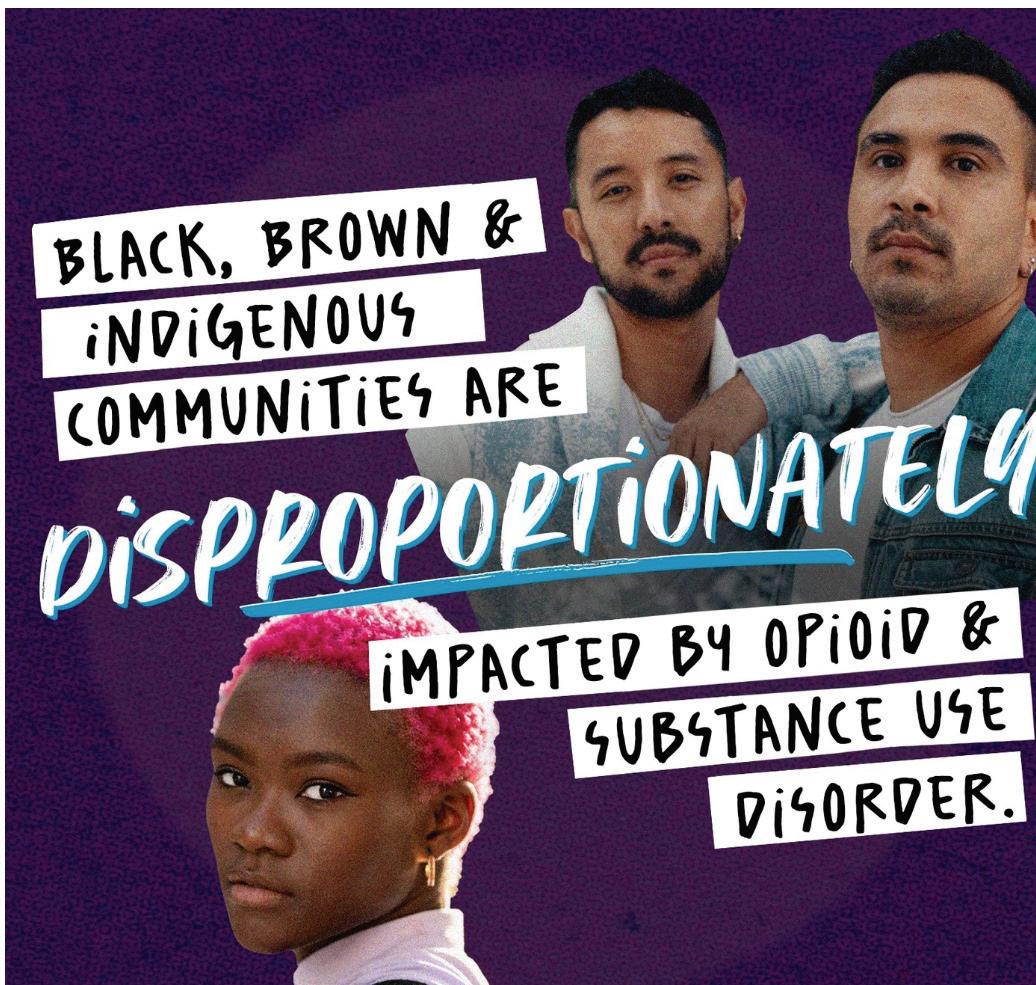
By JOHN PAUL KING
If there is any downside to living in an era when movies about queer people are finally plentiful, it’s that sometimes the best of them are overshadowed by bigger, splashier films and end up getting lost in the mix.
Two such titles are a pair of indie projects, both of which focus on “outsider” queer characters, newly available on the VOD market after brief-and-limited theatrical runs; each of them deserves a better fate than that.
The first of these, “Big Boys,” was a major hit in the 2023 queer festival circuit, winning multiple awards (including Outstanding Lead Performance honors for its young star, Isaac Krasner, at LA’s Outfest) and emerging as an audience favorite. It’s easy to see why.
Written, produced, and directed by Corey Sherman, it’s a small, slice-of-life story centered on Jamie (Krasner), a bright-but-awkward 14-year-old trying to navigate the dual challenges of growing up as a chubby gay-and-closeted teen, who sets out (along with his slick and more confident older brother Will, played by Taj Cross) on a camping trip with favorite cousin Allie (Dora Madison), though he’s initially disappointed when he finds out her new boyfriend Dan (David Johnson III) is also coming along. His attitude changes, however, when he meets Dan, a handsome young man who wears his physical “chunkiness” with an easy confidence. Yes, it’s an instant and impossible crush, leading to a weekend adventure that pushes awkward boundaries for all four campers. But aside from his attractiveness, Dan also emerges as a positive role model for Jamie, who begins to find a confidence of his own.
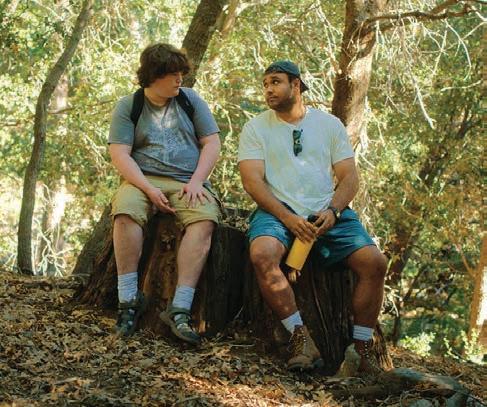
Equal parts bittersweet coming-of-age romance and uncomfortable-yet-endearing comedy, Sherman’s movie wins us over early on largely through the strength of Krasner’s performance, in which the young actor exhibits not just the comedic chops necessary to get laughs from even his most painful moments, but the vulnerability to make
them ring true. Seemingly unafraid of exploring his own identity through his character, he turns in a tour-de-force, which stands up to comparisons with some of the greatest “young actor breakthrough” performances of all time.
He’s given an ideal foil in Johnson, whose easygoing charm as Dan still allows us subtle hints of an internal process that keeps him from coming off as callow and clueless – something that pays off well in the film’s quiet-but-heart-stirring climax, which is best left unspoiled here. Madison also provides invaluable support with a performance that captures the conflicted impulses that come between youth and adulthood, and Cross successfully gets past the casual toxicity of his aggressively hetero-centric character to remain sympathetic.
It’s a stellar collection of performances from an ensemble of relative newcomers, and it goes a long way toward endearing “Big Boys” to a presumably queer audience, which will likely find resonance in the way they each – especially Kasner – convey its theme of trying to claim and define one’s young identity when it goes against the grain of the world around you. But it’s ultimately Sherman, who drew heavily from his own experiences growing up as a plus-size queer kid in creating the film, that deserves full credit – not just for putting it all together, but for having the courage and determination to deliver a queer story that foregoes the glitz and glamour of “gay romance” and connects with the lived experience of viewers who may feel left out of the typically glossy mainstream depictions of queer life.
Cut from a similar cloth is “Cora Bora,” starring “Hacks” fan favorite Meg Stalter as the title character, a bisexual musician who might just be the poster child for clueless self-centeredness. Openly rude, unrepentantly shallow, and blatantly manipulative, she steamrolls her way through life seemingly oblivious to the impact her attitude has on others. Having departed her native Portland – leaving behind longtime girlfriend Justine (Jojo T. Gibbs), though ostensibly maintaining a “long-distance open relationship” with her – to pursue a music career in Los Angeles, success has proven elusive. She decides to make a surprise visit back home to re-evaluate, only to find that a new girl (Ayden Mayeri) has moved in to take her place. When her attempts to reassert her claim in the household just make matters worse, Cora is forced to recognize that both her professional and personal lives are a shambles – but can she find the humility it will take to get “real” enough to repair them?
Directed by Hannah Pearl Utt from a screenplay by Rhianon Jones, “Cora Bora” also relies heavily on the talents of its star player. Statler, in a turn that lends a darker, more desperate edge to the comedic persona that has made her “Hacks” character one of that show’s biggest assets, is at once monstrous and endearing, a ridiculously broad yet shrewdly drawn caricature of modern bourgeois boorishness that serves as a fragile cover for something deeper and – without spoiling anything – profoundly
traumatic. The journey she takes us on is at once hilarious and powerfully affecting, echoing a time-honored comic tradition of transcending pain by finding humor in a pain that feels universal.

She’s aided by an equally gifted supporting cast, with both Gibbs and Mayeri finding the heart to keep either of their characters – the other two points of the film’s romantic triangle – from being positioned as a “villain,” and a convincing turn from Manny Jacinto (known for his breakout “himbo” role on TV’s afterlife comedy “The Good Place”), as a character that would otherwise seem too good to be true, lending credibility to an eventual resolution that hinges on a pile of coincidences that might otherwise seem absurd. There are also appearances from other familiar faces in cameo roles – such as Margaret Cho as part of a polyamorous commune and Chelsea Peretti as an outraged dog owner, that serve as highlights in a movie already rich with them.
Both “Big Boys” and “Cora Bora” are linked by a common thread. Each of them features a queer protagonist, of course, but they are outsiders even within their own community. Ultimately, their struggles have to do with a perspective that separates them from the rest of the world, a lived experience that most of us do not and cannot fully share. It would be easy enough for either film to make its lead character the butt of the joke, but neither of them makes that choice. The humor comes through their relatability, rather than from their “otherness,” and that makes all the difference. Despite these films’ occasional painfulness, their kindness is what comes shining through – not just toward their misfit characters, but toward the misfits in the audience, too.
For our money, that’s what the world needs a lot more of these days, and it places these two hidden gems among 2024’s best releases so far.



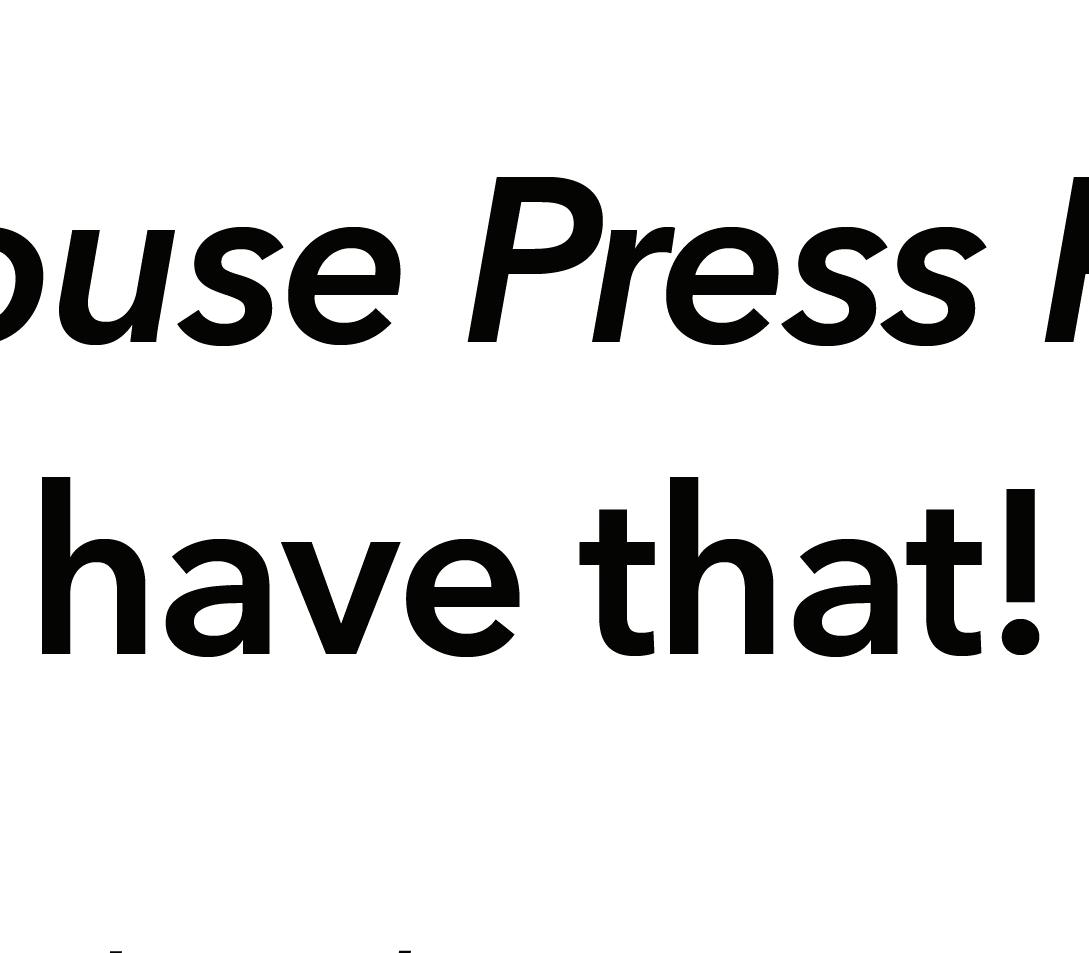
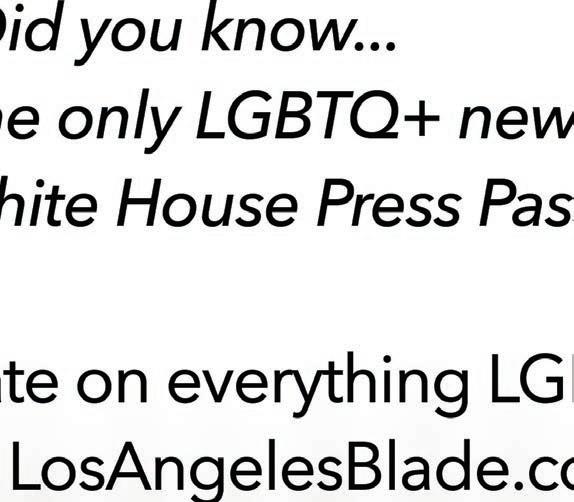



ANNOUNCEMENT
Switch and Save up to $250/ year on your talk, text and data. No contract and no hidden fees. Unlimited talk and text with flexible data plans. Premium nationwide coverage. 100% U.S. based customer service. For more information call 1-844-908-0605
AUTOS WANTED
DONATE YOUR VEHICLE to fund the SEARCH FOR MISSING CHILDREN. FAST FREE PICKUP. 24 hour response. Running or not. Maximum Tax Deduction and No Emission Test Required! Call 24/7: 1-877-434-6852.
GOT AN UNWANTED CAR??? DONATE IT TO PATRIOTIC HEARTS. Fast free pick up. All 50 States. Patriotic Hearts’ programs help veterans find work or start their own business. Call 24/7: 1-855-408-6546.
Get a break on your taxes! Donate your car, truck, or SUV to assist the blind and visually impaired. Arrange a swift, no-cost vehicle pickup and secure a generous tax credit for 2025. Call Heritage for the Blind Today at 1-844-491-2884 today!
Struggling with debt? If you have over $10,000 in debt we help you be debt free in as little as 24-48 months. Pay nothing to enroll. Call Now: 1-877-435-4860.
BATH & SHOWER
UPDATES in as little as ONE DAY! Affordable prices - No payments for 18 mos. Lifetime warranty & professional installs. Senior & Military discount. 1-877-252-9868
Eliminate gutter cleaning forever! LeafFilter, the most advanced debris-blocking gutter protection. Schedule a FREE LeafFilter estimate today. 20% off Entire Purchase. 10% Senior & Military Discounts. Call 1-855-424-7581
Jacuzzi Bath Remodel can install a new, custom bath or shower in as little as one day. For a limited time, waving ALL installation costs! (Additional terms apply. Subject to change and vary by dealer. (Offer ends 8/25/24.) Call 1-855-419-8241
Safe Step. North America’s #1 Walk-In Tub. Comprehensive lifetime warranty. Now featuring our FREE shower package and $1600 Off for a limited time! Call today! Financing available. Call Safe Step 1-888-989-5749
Don’t pay for covered Home Repairs Again! Our home warranty covers ALL Major Systems and Appliances. We stand by our service and if we can’t fix it, we’ll replace it! Pick the plan that fits your budget! Call 1-855-411-1731
DENTAL INSURANCE from Physicians Mutual Insurance Company. Coverage for 400 plus procedures. Real dental insurance - NOT just a discount plan. Do not wait! Call now! Get your FREE Dental Information Kit with all the details! 1-844-203-2677 www.dental50plus.com/ calnews #6258
THIS SPACE CAN BE YOURS CALL 916.288.6011 or email cecelia@cnpa.com
RETIRED COUPLE $$$$ for business purpose Real Estate loans. Credit unimportant. V.I.P. Trust Deed Company www.viploan.com Call 1-818-248-0000. Broker-principal DRE 01041073
When veterinary care is unavailable or unaffordable, Ask for HAPPY JACK Flea/Tick, Mane Dandruff, and Allergy control. AT TRACTOR SUPPLY (www.happyjackinc.com)
SERVICES
GoGo. Live and age your way. Get help with rides, groceries, meals, and more. Memberships start as low as $1 per day. Available 24/7 nationwide. BBB Rated A+ Business. Call GoGo to get started. 1-855-476-0033
CLEANUP & RESTORATION: A small amount of water can lead to major damage. Our trusted professionals do complete repairs to protect your home’s value. Call 24/7 1-888-248-0815
DID YOU KNOW Newspapergenerated content is so valuable it’s taken and repeated, condensed, broadcast, tweeted, discussed, posted, copied, edited, and emailed countless times throughout the day by others? Discover the Power of Newspaper Advertising. For MORE INFORMATION call 916-288-6011 or email cecelia@cnpa.com

By TERRI SCHLICHENMEYER
You can see the CEO’s office from the outside of your workplace.
You’ve actually been in that office, so you know what it looks like inside, too. Big, expansive desk. Cushy, expensive chair. Ankle-deep carpet. The CEO got there through regular means over the course of his career – something you’d like to do, too. But as you know, and as in the new book, “Breaking the Rainbow Ceiling” by Layla McCay, you’ll have to take a different path.
Of all the thousands of board seats and C-suite occupiers in American businesses, only a very tiny number – less than one percent – are occupied by people who identify as LGBTQ. In London, says McCay, no one on the Financial Times Stock Exchange identifies as such. Just six of the world’s leaders, past or current, have come out as LGBTQ.
The reasons for this are many, from discomfort to a sense of a lack of safety or just plain mistrust. Employees often don’t talk about it and employers can’t or don’t ask, which can lead to a lot of issues that cis, heterosexual employees don’t have to think about.
LGBTQ employees make less money than their straight co-workers. They experience discrimination ranging from sexual violence on one end, to micro aggressions on the other. Discrimination can be found in educational settings, and networking events, in a lack of mentorship, and the feeling that one needs to “code-switch.” Even an overseas job offer can be complicated by identifying as LGBTQ.
And yet, says McCoy, there are benefits to coming out, including a sense of authenticity, and feeling as if a load has been removed from one’s shoulders.
If you are an employer, McCoy says, there are things you can do to help. Include LGBTQ people in your diversity programs at work. Insist on it for recruitment. Make sure your employees feel safe to be themselves. Make all policies inclusive, all the time, from the start. Doing so benefits your business. It helps your employees.
“It’s good for society.”
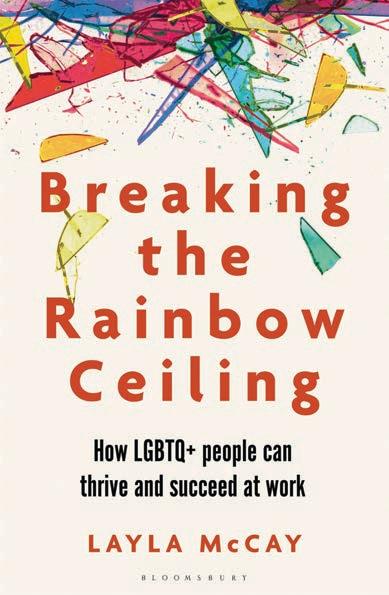
Pretty common sense stuff, no? Yeah, it is; most of what you’ll read inside “Breaking the Rainbow Ceiling” is, in fact, very commonsensical. Moreover, if you’re gay, lesbian, bi, trans, or queer, you won’t find one new or radical thing in this book.
And yet, inside all the nothing-new, readers will generally find things they’ll appreciate. The statistics, for instance, that author Layla McCay offers would be helpful to cite when asking for a raise. It’s beneficial, for instance, to be reminded why you may want to come out at work or not. The advice on being and finding a mentor is gold. These things are presented through interviews from business leaders around the world, and readers will find comfort and wisdom in that. You’ll just have to wade through a lot of things you already know to get it, that’s all.
Is it worth it? That depends on your situation. You may find nothing in “Breaking the Rainbow Ceiling,” or it may help you raise the roof.
